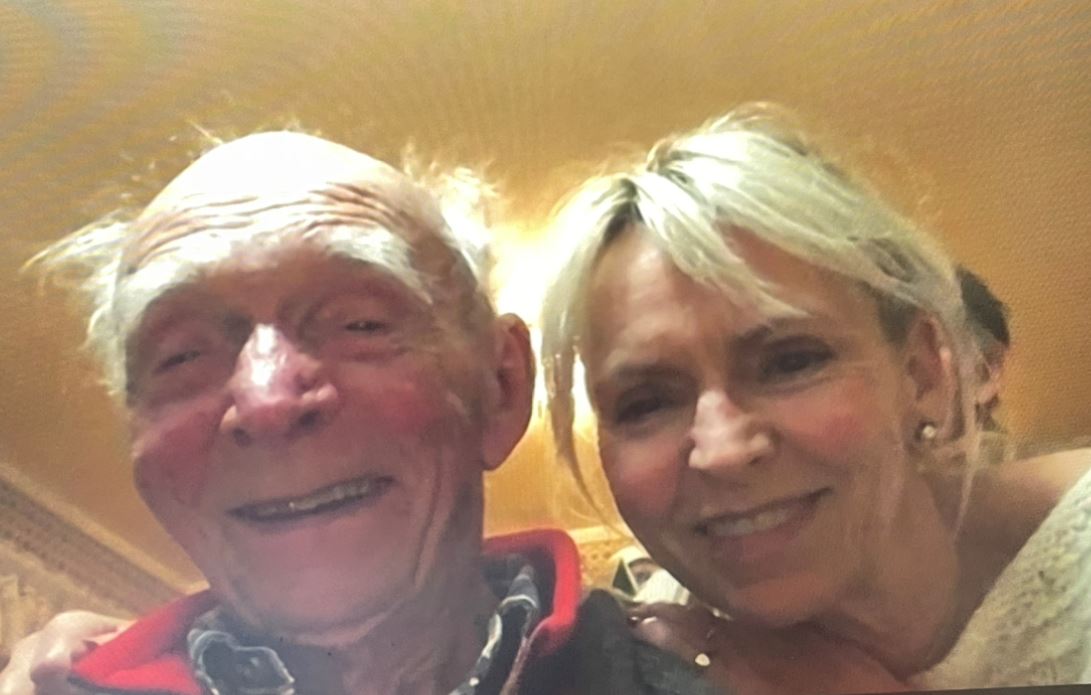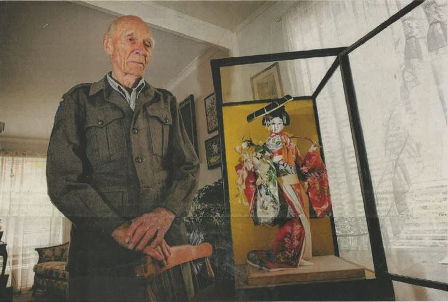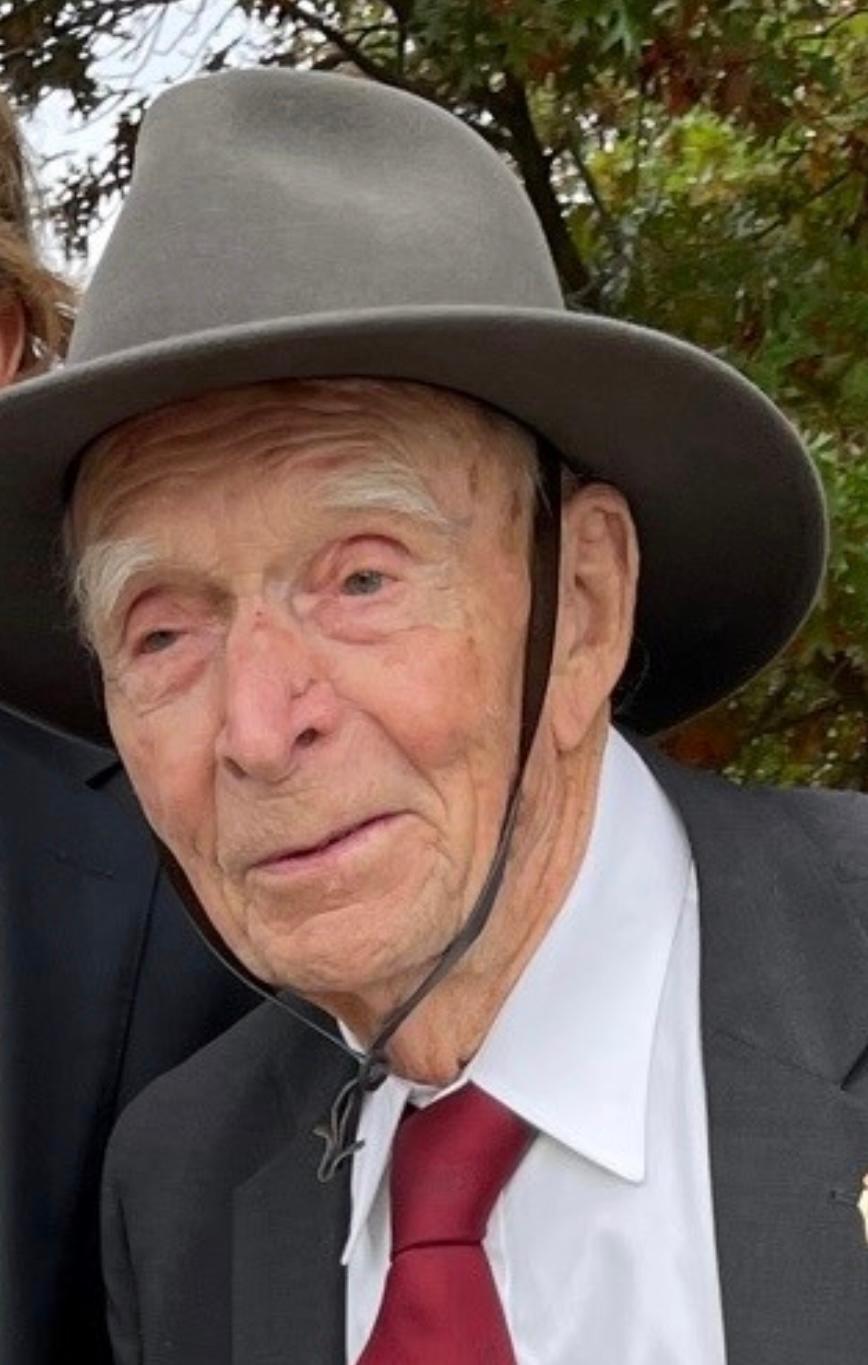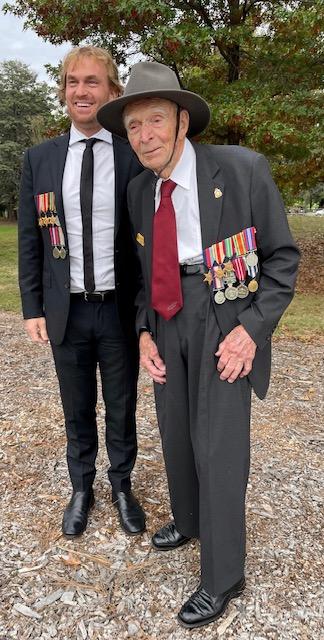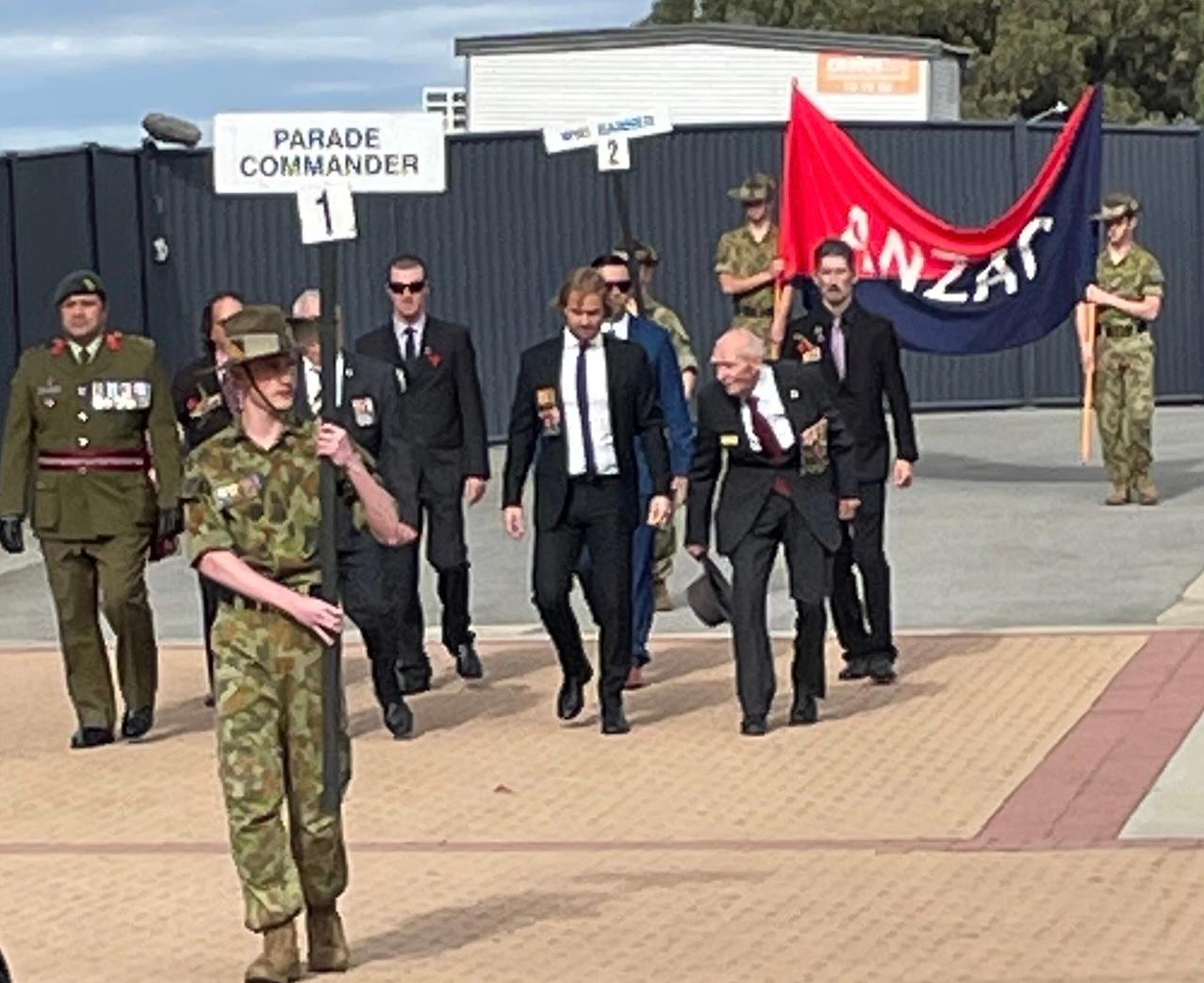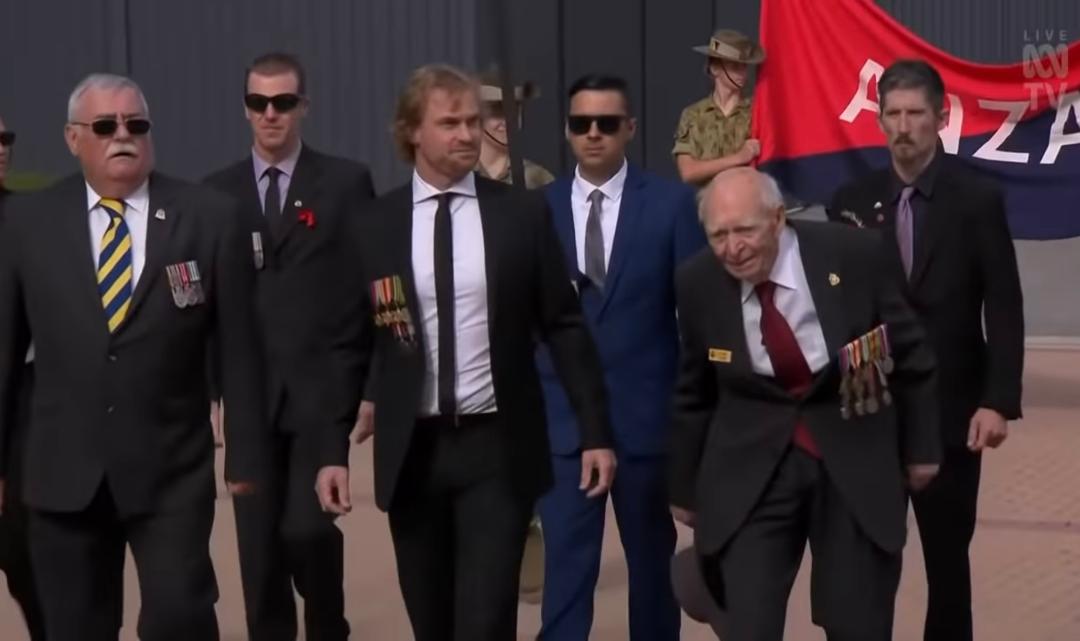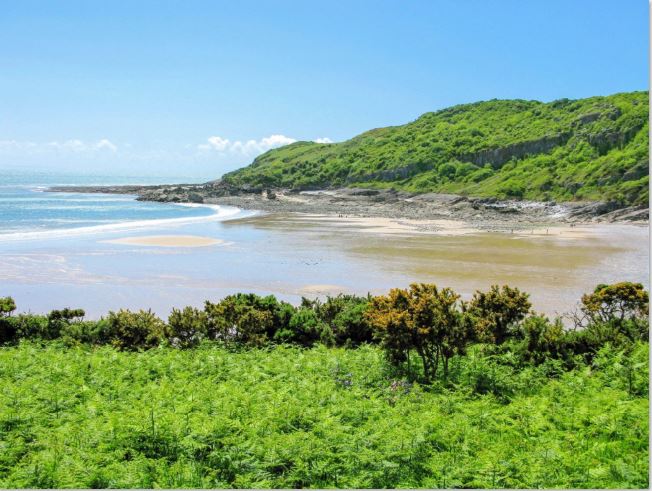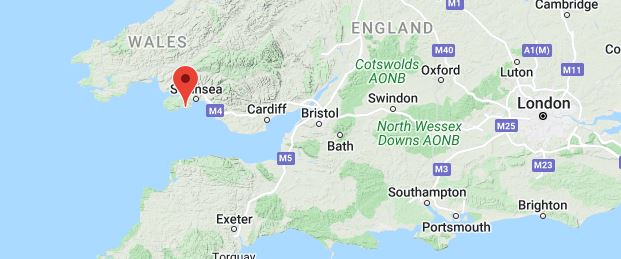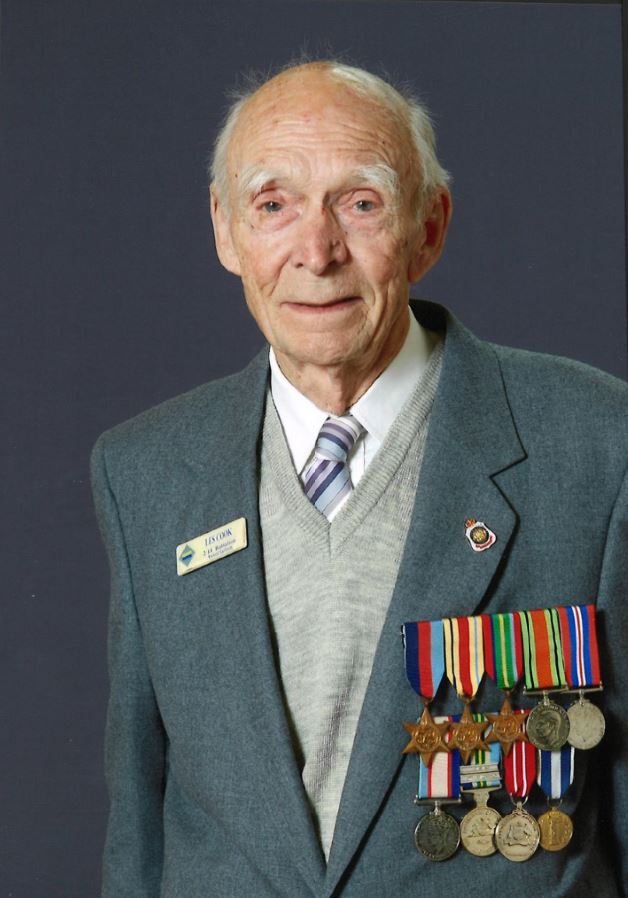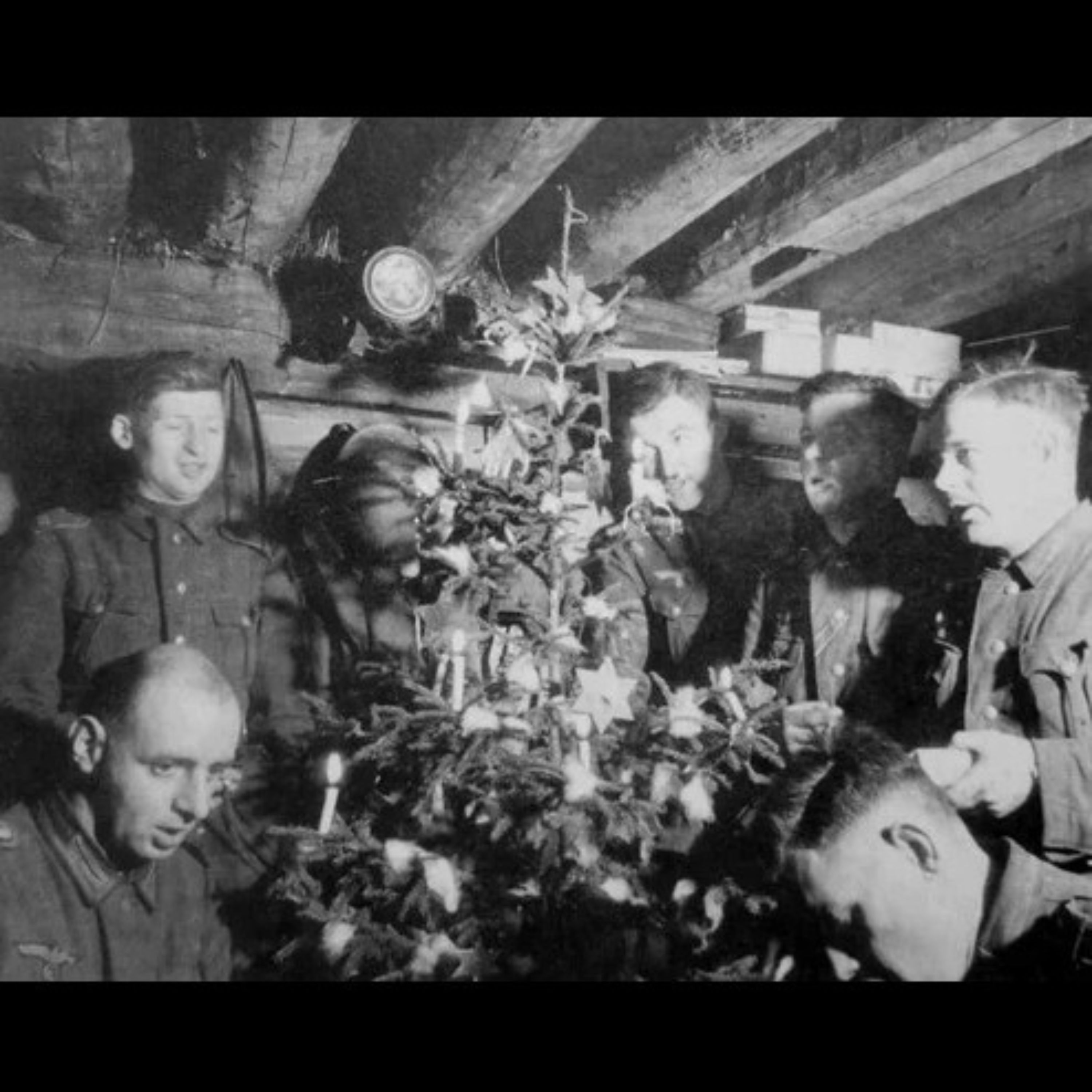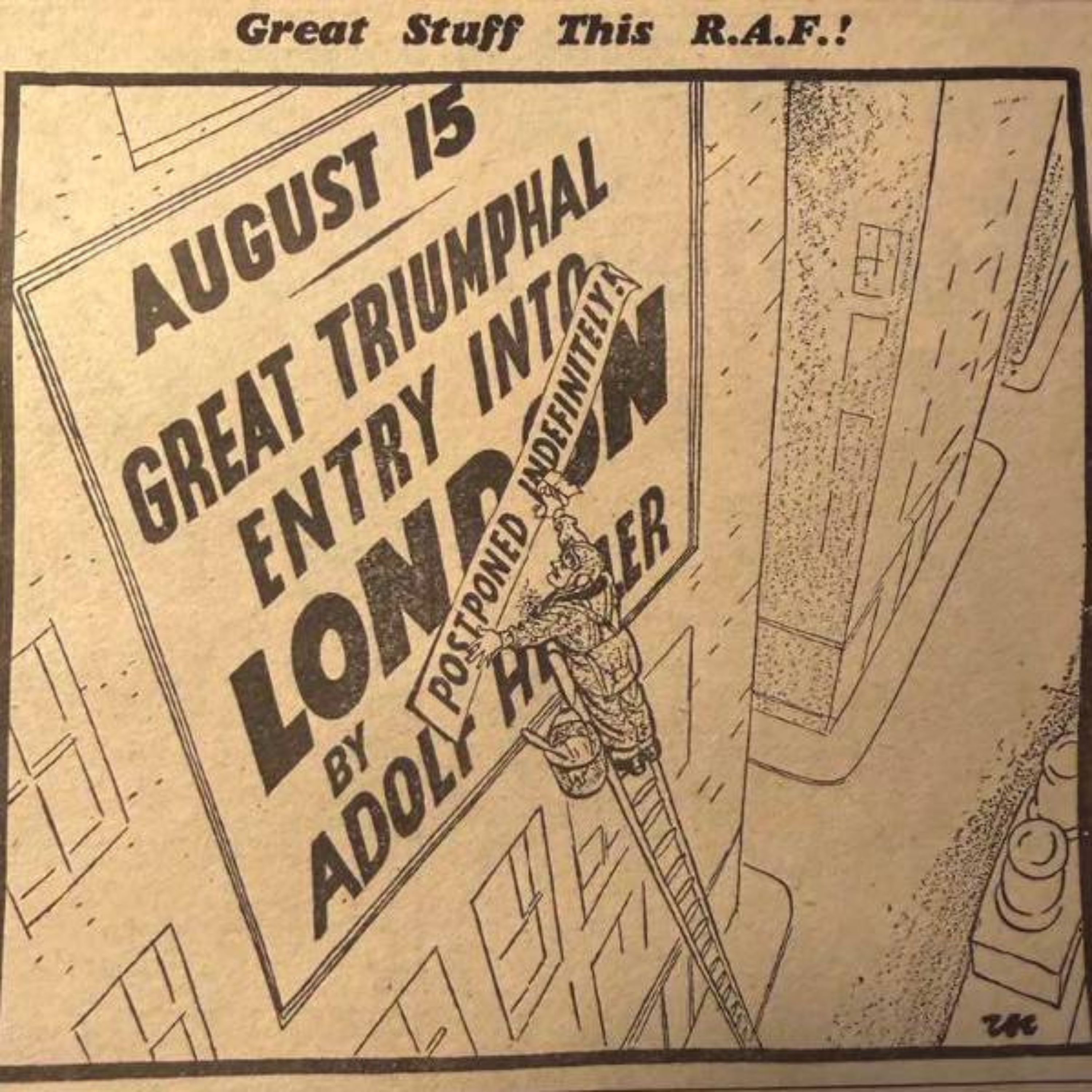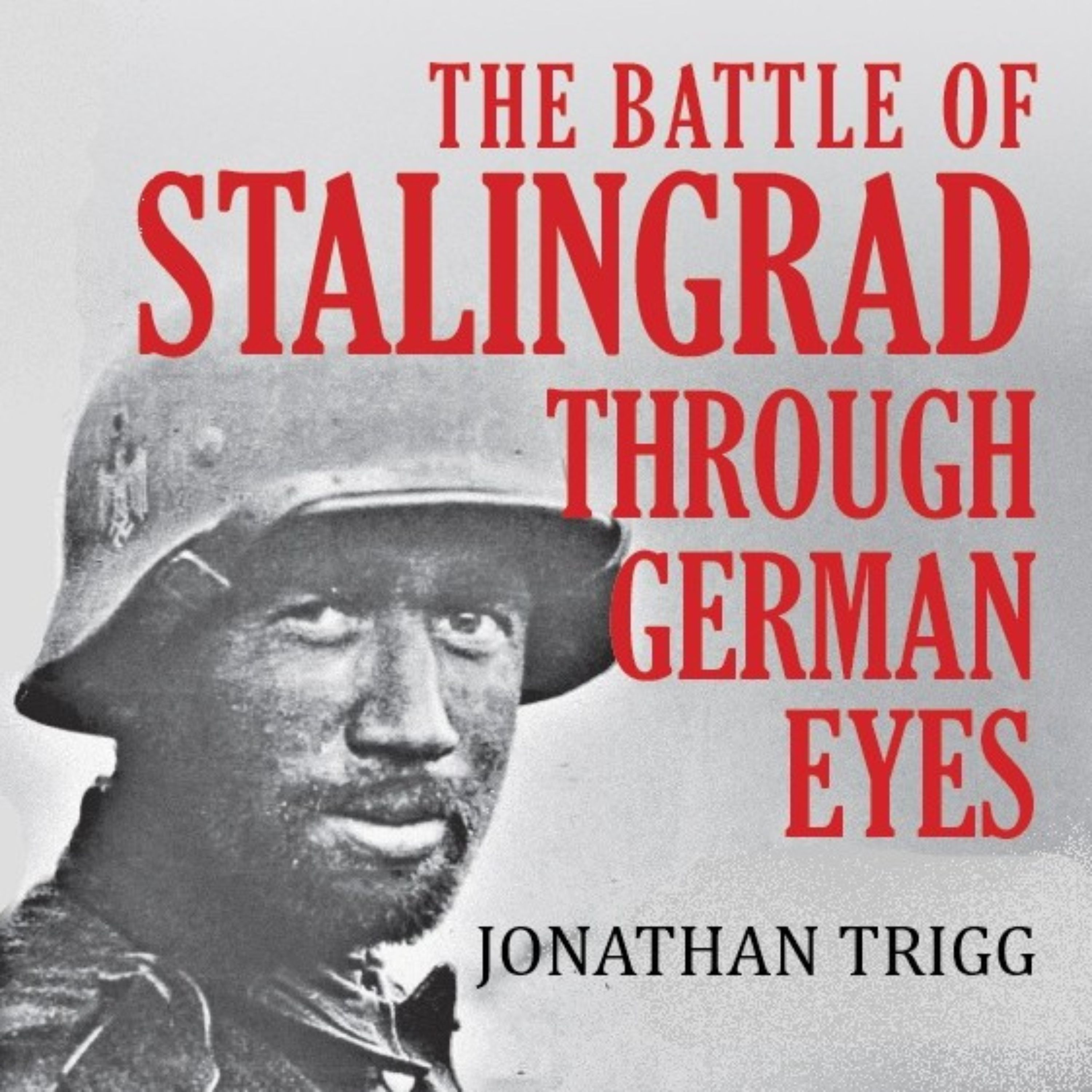83 Australian Cpl Leslie Cook and the Japanese Doll

A poignant reminder for us to be at peace with each other
The tale of an Australian soldier who has to bury dead Japanese soldiers - a very distasteful duty but one which years later paid him back in positive ways he could not have imagined at the time.
More great unpublished history!
Donate To Salvation Army Ukraine Crisis Appeal
https://bit.ly/FightingThroughSalvationArmy
Red Cross/ Disasters Emergency Committee
https://bit.ly/FightingThroughRedCross
Link to Anzac Day parade led by Les Cook
https://youtu.be/c4sGEiex73I
Research links
www.ww2talk.com
https://www.fightingthroughpodcast.co.uk/p/research/
Pwll Du Bay in Wales.
Where U-Boats sneaked up!
https://www.enjoygower.com/pwll-du-bay
Rob Edmunds historical writer
https://twitter.com/RobEdmunds11
Goliath mini tank
https://en.wikipedia.org/wiki/Goliath_tracked_mine?wprov=sfti1
Island Destiny, stories from a German medic on Guernsey
https://guernseypress.com/news/2008/05/20/love-across-war-lines/
Island Destiny: A True Story of Love and War in the Channel Island of Sark https://www.amazon.com/dp/1903341361/ref=cm_sw_r_awdo_YQC974WAG5S89E17478Y
Reviews on main website
https://www.fightingthroughpodcast.co.uk/reviews/new/
Apple reviews - https://itunes.apple.com/gb/podcast/ww2-fighting-through-from-dunkirk-to-hamburg-war-diary/id624581457?mt=2
Follow me on Twitter - https://twitter.com/PaulCheall
Follow me on Facebook - https://www.facebook.com/FightingThroughPodcast
Interested in Bill Cheall's book? Link here for more information.
Fighting Through from Dunkirk to Hamburg, hardback, paperback and Kindle etc.
Late entry - WW2 veteran Les and daughter Debbie during the Zoom coffee.
Les with the Japanese Doll 2012 WW2
Les at Anzac Day Parade 2022
Pwll du Bay Wales WW2 Uboat water hole
Map illustrating location of Pwll du Bay Wales WW2 Uboat water hole
Fighting Through WW2 - Episode 83 – Corporal Leslie Cook and the Japanese Doll
More great unpublished history! WWII
Intro Passage 1
An exquisitely-dressed doll in a glass case stands in a prominent place in our home in Canberra and I have often been asked about its origin
Intro Passage 2
In addition to its sentimental value as a token of gratitude, the doll is a constant reminder to me of the tragedy of war.
Intro Passage 3
We had been in the Owen Stanley mountains for three months before we reached the coast at Gona, and already were half-starved and exhausted.
Intro Passage 4
We learnt, with a vengeance, the significance of those signs we had seen on the winding road from Port Moresby to the start of the Kokoda track. The three signs read, in order as we passed them, “one mite” … “one bite” … “goodnight”.
Intro Passage 5
Nobody who was at Gona will ever forget it.
Welcome
Hello again and another exciting/warm WW2 welcome to the Fighting Through second world war podcast.
I’m Paul Cheall, son of Bill Cheall whose WWII memoirs have been published by Pen and Sword – in FTFDTH.
The aim of this podcast is to give you the stories behind the story and much more. You’ll hear memoirs, and interviews with veterans in all the countries and all the forces.
Today is the story of the Japanese doll which we covered partly during the interview in episode 82 and I'm going to read it as Les himself originally wrote it. You heard a few previews of the story in the intro to this episode.
Right now a bit of follow up from the last episode, firstly from Debbie, Les’s daughter:
“Les recently took part in the Anzac parade in Australia and led the march no less. Deb has sent me some great photos which I’ve posted in the show notes to this episode along with a link to a video of the parade. It was great the way Les’s proud escort never left his side for a second. What a great set of photos if you’ll take a look.
And there’s a link in the show notes to the parade itself.
Link to Anzac Day parade led by Les Cook
Buy me a coffee
Just for starters, a few Coffee and Calvados donations gratefully received from
1 - Patrick Grooters
Kalamazoo Michigan united states
2 - Graham Currie
Orlando
“Love the podcast Paul. I’ve read thousands of books about WW2 and love your Dads book. I read because of the inspiring human stories that emerge and thats what I like about your podcast and your Dads book.
Thank you so much Graham.
First a few news, reviews and family stories:
Review 1 Matt Vancouver British Columbia Canada
Thanks to Matt for his 5 solid stars in my latest Apple podcasts review.
Review 2 Wolfie Wolfe on Apple
I just went to a funeral last week to say goodbye to a cousin of my mothers. He was a navigator on a B17 8th Army Air Force stationed in England during WW2. He was 96. They had his old navigator maps. With his flight path in red grease pencil. One to Berlin. Also the old pictures of him and his buddies In London on Liberty call. The Air Force sent a detail and gave the funnel flag to his Great Grandson.
Craig Gingell
On Castbox. With WW2 history it's all to easy to see soldiers as numbers or statistics in grand battles. Paul's podcasts reminds us all that these were people doing extraordinary things when called upon.
Addis Gap
from the United States
Shout out 1 Craig Gingell - Cardiff
Kind comments on the show from Craig who adds
I'm heading to Normandy at the end of May and will be taking my kids to some of the D-Day beaches to make sure the next generation understand what people went through to earn the freedom we now all enjoy. How good is that!
And Craig has just bought one of the three remaining signed hard copies of Dad’s book with bookmark, pics and a (strictly limited edition) FT jig saw And blow me he bought me a nice Calvados to boot. Thank you Craig.
That reminds me I went to the shops last Friday afternoon on my bicycle and bought a bottle of Calvados which I put in the bicycle basket. As I was about to leave, I thought to myself that if I fell off the bicycle the bottle would break. So, what the heck, I drank all the Calvados before I cycled home. And you know what? It turned out to be a very good decision because I fell off my bike 7 times on the way home! Strewth!
Craig you also sent me this lovely WW2 family snippet:
My mother has told me that my grandfather, Edwin Holder, was part of Mountbatten's personal guard in Burma.
He survived malaria twice but died of lung cancer when I was 3 (c1984) and the only info I have is that one of his best friends got shot and they evacuated down the mountain to the casualty evacuation point, but died when they got to the CASEVAC. He was also the only one who survived, of all the people he knew who joined the army with him from Ebbw Vale in South Wales.
My mother has his service book in the loft so I'm hoping to soon have details of his regiment and service number which will hopefully shed more light on his activities.
Craig I’ve sent you a link to the FT Research tab from my home page which has helpful research links for all sorts of enquiries you might have. Links in show notes. And if any listener can recommend a good book about Mountbatten which might reflect Craig’s grandfather’s war whereabouts, I’m sure Craig would be grateful.
https://www.fightingthroughpodcast.co.uk/p/research/
Shout out 2 Kyle Romanishen
Really enjoy your podcast, gave it 5 stars on
Spotify.
Especially liked episode 73, POWs in WW2
I have been to Poland. Been married in Szubin. And I’ve seen where the soldiers stayed.
A very special place for me.
Thanks
Kyle Romanishen
Stoney Creek, Ontario
Canada
Craig I’ve just been re-listening to episode 73 about the POW’s and it really is a cracking story for anyone who hasn’t heard it yet. And if anyone has a penchant for POW’s, the easiest way to check out the category of any subject such as Dunkirk, Tanks or indeed POW’s is to click on the Episodes tab at the top of my home page and the Categories list will drop down to help you see the beaches from the Bocage.
Shout out 3 – Dustin Fisher Ontario Canada
Hello Paul,
My name is Dustin Fisher from. I'd like to first thank you for your father's service! Him and so many others will forever be my heroes.
Thank you for all of the amazing work you have done on your podcast. I am currently on episode 31 and I listen near every day at work. Can't wait to hear from your mum!
I have always been interested in the wars and this podcast has captivated and inspired me to get back into researching the wars.
Dustin Fisher, Kitchener-Waterloo, Ontario!
Thanks for your interest and kind comments Dustin. That’s some place name where you live and seemingly only a stones throw from Brantford where Captain Hovell from WW1 episode 48 fame once lived briefly. And you’ll love my dear Mum’s stories when you get to her. Search under the Categories for Women at War – of which we’ve heard from several.
Feedback Rob Edmunds
Rob Edmunds is an historical novelist and we recently exchanged a few words via Twitter. He’s currently writing something based around, would you believe, Burma and India in WW2 so I’ll look forward to hearing more.
“I live very close to Pwll Du Bay in Wales. Its claim to fame is that it was the location during WWII where the German u- boat crews would come ashore under cover of darkness for fresh water. Technically, it must be the last place on the British mainland to have been invaded by a hostile foreign power.
I looked it up and Pwll Du is a secluded bay at the end of Bishopston Valley. The beach is backed by a large bank of limestone pebbles with plenty of sand at low water, Link
https://www.enjoygower.com/pwll-du-bay
Just for your interest I’ve put a couple of photos in the show notes, one of the bay and one of its location not far from Swansea on the South coast of Wales, really not that far from Cardiff or Bristol – indeed actually in the waters of the Bristol Channel – wow – crafty Krauts, stealing water from right under our noses.
Rob thanks for that precious little nugget of WW2 history – I’m putting a link to your Twitter account in the shownotes, where people can find out more about your novels about Masinissa, an ancient African King. Stunning photos you’ve put in there too.
https://twitter.com/RobEdmunds11
Feedback 2 Wayne
Wayne Howard, my mate from Norfolk, just phoned to take the mickey out of my Australian accent but says I can carry on trying because it gives everyone a laugh – not because it’s good by the way … But he nevertheless enjoyed my rendition of Les Cook’s story about the Aussie trooper who impatiently interrupted the noisy, screaming, Japanese poised to attack by shouting
“If yous’re going to have a go, don’t stand down there all night talking about it “. Better than last time? Worse?
Wayne added a little Fighting Through Factoid that the reason the Brits are referred to as Poms by the Aussies, is because in the early days of successive ships delivering yet another shipload of British convicts down under, they were colloquially referred to as Prisoners Of Her Majesty, with a silent H – hence POM, or to coin a phrase “Yet more bloody Poms” or as in Rugby football or cricket, “Strewth, Barry, the Poms have beaten us agin!”.
Feedback 3 Bernie Walker
My heart goes out to the people of the Ukraine. Keep up the hard fight!
And Bernie has sent me the most brilliant Christmas story about the war in North Africa involving the Italians – so guess what – I’m going to save it not till the PS but … Christmas - that’s C 22! It’s in the template doc just waiting for Santa time!
Feedback 4 – Julian Peter - Hamburg
Dear Paul,
I have been meaning to write to you for some time, thanking you for the amazing podcast you produce. I often say that reality is more incredible than fiction, and the stories you share go beyond our (by that I mean those who live in peacetime) wildest imagination. I particularly enjoyed the episodes on the Lancaster (for obvious reasons), but the episode on the Wrens as well as the episode with your mother were especially meaningful.
It has now been about two years that I have been researching the last flight of Avro Lancaster PB958 and its crew. I have collected piles of archival documents which paint a vivid picture of who these men were, and have been able to contact a number of their living relatives. It's moments like these that really make all the long hours work worthwhile, bringing back a long lost uncle or cousin or in some cases, even someone´s father.
I am currently painstakingly transcribing the nearly 200 page handwritten transcript of the war crimes trial held here in Hamburg at the Curio-Haus in the summer of 1946, in relation to PB958 and the murder of F/SGT Kevin George Clark.
Statements by witnesses, statements by the accused - 1946 cursive is nigh illegible, but over time letters start to form familiar words, and those words complete sentences.
I intend to write a book as a lasting memorial to the crew of PB958, one story among thousands similar, and you can bet that the Fighting Through Podcast will get a sneak peak as well! Good man Peter!
This week I met with one 92-year gentleman, who used to be a Flakhelfer (Luftwaffe auxillary staff) in 1945. He showed me his original 1943 aircraft identification handbook, as well as a written retelling of his memories and experiences. He has asked me to identify an aircraft from his childhood, a fresh wreck he crawled through.
Last winter, I helped a fellow historian uncover an old wartime mystery, of an unknown aircraft crashing in his village. Hours of checking various databases provided a match, and not only were we able to successfully identify it (a B-24 by the name of BAR T), but a local citizen reached out with airplane parts which turned out to be a quite well preserved Norden bombsight from the very same aircraft. We are currently trying to turn it into a permanent memorial in the village, and by doing that hope to keep the history alive.
Thank you once again for the work you do, and I cannot wait until the next new episode comes out!
Take care,
Julián
Julian many thanks for that and do keep in touch with your progress as I know there are stacks of people who are very interested in Lancasters and their heritage and they’ll queue up just to hear word of some new discovery.
A final word - a wry knowing smile from me regarding that bombsight that suddenly turned up out of nowhere - we’ve heard before on this podcast how the locals ransack crashed planes –just to grab a souvenir or two – and maybe it was no bad thing when it possibly saved parts from complete melt down in the knackers yard.
Family stories 1 Brad Chutz
Brad Chutz
From Pittsburgh Pennsylvania
My grandpa was John Deitrick and he was in the Navy during WW2. His squadron (Motor Torpedo Boat Squadron 21) received the Presidential Unit Citation in Oct 1943. He was a Gunners Mate First Class and was discharged in Oct 1945.
He was the cook on the boat which included 12 enlisted men and 2 officers. His squadron followed a convoy to Papa New Guinea and then patrolled the Admiralty Islands and most of his time was spent in the SW Pacific Area.
(Side note) he used to cook my twin brother and I breakfast and would always load up the eggs with lots of salt and pepper, we asked grandpa why he did that and he said it was because when he cooked the imitation eggs on the boat, he'd have to load them up with salt and pepper cause they had no taste. Better than Bully Beef Brad!
I work at a golf course and any time I'm on a mower, I listen to your podcast. I'm on episode #38, so I still have quite a few to listen to, they definitely help my day go on quicker and more enjoyable. The only issue I sometimes have is understanding the accent some of the British Vets have lol – Brad you mean like Wilf Shaw’s Pies av come and Over there?!
Brad eventually you’re going to arrive at the Aussie veteran Les Cook stories and you’re going to hear about someone on a grass mower in a very precarious position and you’ll smile and think back to this warning – so rubber stamp it in your brain for when the time comes – I’ll say no more. Do drop me a line when the penny drops.
Thanks Brad
Family stories 2 Mark Wright-Johnson
Santa Fe, New Mexico
Paul,
You recently asked for information on mini-tanks. I heard an account somewhere of a German soldier defending the Normandy beaches operating one of these. This soldier was under such intense fire he had trouble both with control wiring being destroyed by bombs and just being able to observe progress of the vehicle. Link
I know how much you enjoy an amusing war story. A friend of mine became a pilot of B-52s. Part of his initial training was escape and evasion which took place on some acreage adjoining an airbase in Washington state. A group of students were put on one side of the acreage and had to reach the other side without being seen by two or three officers who walked around at random. Of course this military zone is fenced off, but for safety reasons and given that it was hunting season, students had to wear orange vests
Again, much thanks for the podcast and for the Ukrainian appeal
Mark Wright-Johnson
Thanks Mark and I’m pleased to advise that sixty people have linked through to the Red Cross and Salvation Army charity links I posted in the show notes and I’ve left them there for anyone else who wishes to support these humanitarian charities which are doing such good work. If you click on the links you’ll learn that they are doing much more than cups of tea and sandwiches in railway stations. Those sixty donors could have left more than a thousand dollars/pounds to those appeals.
Family stories 3 Andy Creber Canberra
My Pop was a Medic for the Wehrmacht and was part of the Occupying Forces in the Channel Islands., this is how he met my Nan.
He managed to have a book, An Island Destiny, published on the stories on his life and here is a link to a small part of his story.
https://guernseypress.com/news/2008/05/20/love-across-war-lines/
There’s just one snippet from his story I’ll share with you:
“My father used to say, before I was sent from Germany, that if I had to go and occupy somewhere, to make sure I treated everyone humanely, with respect, and they would treat us in the same manner. It was true.'
And you can read more about Werner Rang’s war as a German medic, how he met his British wife to be and his destiny as a POW in Britain at the link in the show notes.
Family stories 4 - Steven Ginn
If anyone needs an Architect in Omaha, Nebraska then I suggest you contact Steven Ginn of Steven Ginn Architects, because if he designs as well as he tells stories then he must be good!
This story wins the year’s Spooky or What? award
Steve has said “My dad, Bill Ginn, was in school at Harvard in the fall of 1941 and thought it odd the Japanese Ambassador’s son was not in class on December 5th. He never missed class.
On the 7th my dad realized why - when he heard about Pearl Harbor. Wow!
Dad signed up to fight two days later.
When he enlisted, they thought he looked Italian (he’s not, he’s actually of English/Irish decent) and sent him off to learn Italian with the expectation he should be dropped into Italy to facilitate the resistance. But he was injured during training and ended up translating for Italian POW’s in California. And listeners wouldn’t we just love to hear from any of those?
Steve continues - My Uncle, James Fulton, signed up in 1939 and was a military engineer under Omar Bradley, for whom he had great affection. He served from North Africa, up through Italy and into Germany. After the war, he went back to Italy and married my Aunt Flora who was quite a lady. She spoke English and had two college degrees, unheard of in a woman from Italy in 1945.
After they were married, they spent 10 years in Japan as part of the occupation force. As a kid, when I asked my uncle about the war, he would brush me off and say, “No one wants to talk about that.”
Thank you again,
Steve
Thank you Steve - Don't you just love it when you get these little threads of Interest repeated throughout the show from time to time. No sooner have we finished listening to Les cooks stories of the time he was part of the occupation Force in Japan, than up pops Steve with this story of his Uncle doing similar! Just great stuff.
Main event
I've been keeping this one back from the earlier series of stories because I thought it was rather special. It’s the tale of a soldier who has to bury dead Japanese soldiers, a very distasteful duty but one which many years later paid him back in positive ways he could not have imagined at the time.
You’re going to learn that this true story contains much more than the interview with Les. And even after the third time of reading it, I still find it to be an incredibly moving and powerful story. On more than one occasion I have felt myself welling up with emotion at what I’ve been reading. You may well find such moments yourself. I give you permission to cry. Here we go:
The Japanese Doll
An exquisitely-dressed doll in a glass case stands in a prominent place in our home in Canberra. About 40 cm tall, the figure is of a girl in traditional Japanese costume. Its striking beauty has always attracted the attention of visitors, and I have often been asked about its origin
The doll was given to us by the Kondo family of Japan in thanks for returning to them personal effects of a member of their family, a Japanese soldier who was killed in New Guinea during the war
In addition to its sentimental value as a token of gratitude, the doll is a constant reminder to me of the tragedy of war.
As I gaze at it today my thoughts take me back almost sixty years to the fever-ridden coastal swamps of New Guinea where this story began. In my mind’s eye I see the desolate scene again so vividly and in such detail that, for a moment, I feel as though I am actually there. I hear the incessant rattle of rifle and machine-gun fire, sense the oppressive heat and humidity and the cloying stench, and feel the numbing tiredness that dulls all sensation, even fear. I see the gaunt, exhausted faces of my mates, and I remember those who are gone. With the sentimentality that comes (when we grow old) to those who have lived through desperate battles, I am saddened by the awful human cost of war.
The battle for Gona and the clean-up afterwards was my worst experience of the war. We had been in the Owen Stanley mountains for three months before we reached the coast at Gona, and already were half-starved and exhausted. Gona was a small village surrounded by a feted swamp infested with a multitude of biting insects - some of their bites being fatal. We were in open kunai grass country without shade, and lived almost continually in slimy swamp water, which often was the only water we had to drink.
The Japanese were hemmed in with their backs to the sea. Their country had abandoned them, there was nowhere for them to go, and they fought to the bitter end. Diaries taken from their bodies after the fall of Gona are stark evidence that they were aware of the utter hopelessness of their position, but those same diaries also tell of their determination to fight to the last.
Although it seems to me now to have been much longer, the battle lasted only about three weeks. It had become a battle of attrition. Reading the official history now, it is clear that even our own high-command was almost despairing of the outcome because of the numerous unsuccessful attacks and the high casualties. Unaware of their concern, the few of us who were there, just kept going.
Sickness and disease caused more casualties than the enemy. Scrub-Typhus, a disease caused by the bite of a tiny mite, was a certain killer in those days, and cerebral malaria and dysentary also were responsible for many deaths. We learnt, with a vengeance, the significance of those signs we had seen on the winding road from Port Moresby up Hombrum Bluff to the start of the track to Kokoda. The three signs read, in order as we passed them, “one mite” … “one bite” … “goodnight”.
We were so short of men that, apart from the wounded, only those whose temperatures went above 104 degrees F (40C), or who were unable to stand, were evacuated to the field hospital at Soputa, about 15 km back. The walking wounded, and the sick who were able to do so, made the trip on foot through the mud. The sick who were considered likely to recover from their sickness in a few days were merely sent back about 1 km where they could, at least, lie in the shade of the trees, and where they either got better or worse, largely on their own merits. There were few medical supplies.
After the fighting was over, we were faced with the unpleasant task of burying the dead. The Japanese had stopped burying or burning their dead, but just put them outside their bunkers and weapon-pits, sometimes in heaps more than a meter high. The latter was done probably with the intention to burn them in due course, as was their custom, but the intensity and closeness of the fighting did not allow this. Our dead, inside and close to their perimeter also remained unburied.
There were places around some of the positions where the dead of both sides were intermingled as the positions were won and lost in the sea-sawing battle. More than one thousand dead from both sides, in various stages of decomposition, lay in this very small area when the battle was over. Nobody who was at Gona will ever forget it.
Indeed, when I look back on that year of 1942, I believe that none of the units that had served in the Middle East, and had returned more or less intact and unchanged, were ever the same after the Owen Stanley and Gona campaigns. This would be equally true, of course, of those units that served at Milne Bay, Buna, and Sanananda Point that year.
After Gona fell on 8 December 1942, some units started moving up the coast towards the mouths of the Amboga and Kumusi rivers to contain the Japanese forces that had landed there to reinforce the Gona garrison. The rest of us were engaged initially on burying the dead, a task which occupied us for three days in the most awful conditions.
It was customary in such circumstances to collect from the enemy dead any papers or documents. that might be of use for intelligence purposes. These were passed to our Intelligence people. Among other things I had collected was a diary and a flag taken from the pack of one of the Japanese we had buried. The flag was of white silk about 90cm square with the large red dot of the rising sun in the centre, and around which were hand-written Japanese characters in black ink. I understand that these characters were wishes of good luck written by the family and friends of the soldier.
Many of the Japanese who served in that 1942 campaign in New Guinea carried these flags, and many also wore the belt of a thousand stitches[a good luck charm]. These men had been at war for a long time, having. fought in China, the Malay peninsular, and in Java before going to New Guinea. This particular man had left Japan in February 1940, almost a year before Japan entered the war, so probably was in all those campaigns.. I do not recall seeing a Japanese soldier with either of these things in subsequent campaigns. I wonder why.
Our Intelligence people had all the information they required, so I was allowed to keep the diary and the flag. I took them with me when I came back to Australia at the end of January 1943 and left them at home.
End of the war
I was at Balikpapan in Borneo when the war ended and went to Japan with the Australian contingent of the occupation forces. While in Japan we took our turn with other British Commonweath countries and the Americans on guard duties in Tokyo. One of the places we guarded was the Yasukuni Shrine - a Shinto shrine dedicated to the spirits of those Japanese who have died in battle. The attendants at the shrine were all old soldiers, one of whom could speak English. While discussing the differing aspects of the Shinto and Christian religions with him, I told him of the flag and diary. He explained that, in Japanese family remembrance ceremonies, there is deep spiritual significance in having something that was with the deceased relative at the time of death. Becoming aware that the articles I had taken home as souvenirs would be of such great comfort to the soldier’s family, I realized that it would be morally wrong for me to keep them. I resolved then that I would return them to his family if possible.
Japanese Embassy
Our family moved to Canberra in 1964 and I frequently passed the Japanese Embassy on my way to and from work. This reminded me of the diary and flag. I took the diary to the Embassy asking if they could identify the soldier from it and, if so, would they try to locate the family and have the diary and flag returned. The people with whom I spoke at the Embassy didn’t appear to be very interested in doing anything, so I let the matter drop.
About ten years later a girl from Thailand, who had come to Australia to further her education, was living with us. We called her “Tim” because we had difficulty pronouncing her real name. She was studying the Japanese language as part of a University course at the Australian National University. A Japanese national [Mr Kaneko] was her tutor. Tim took the diary to Mr Kaneko asking if he would help in finding the family.
I think that this occurred in 1976 when our Prime Minister was planning to visit Japan. Japanese journalists had come to Australia in connection with the proposed visit, and Mr Kaneko showed the diary to these journalists who agreed to do what they could to help.
They came to our house where we talked for two hours, during which I gave them all the information I could. Interestingly, they felt that knowing the age of the soldier would be of great assistance to them in their search, and asked me several times if I could remember. It had been more than thirty years ago. We had buried hundreds after that battle, and it was only one of many battles and many burying parties.
I didn’t think that it would be possible to remember him in such detail, but, concentrating on it because of their insistence, I could see him again, in my mind’s eye, as if I was presently looking at him. I said that I thought that he would have been in his mid-twenties, which turned out to be correct. The effort involved in doing this took me back to the swamps of Gona with the constant firing, the heat, the numbing fatigue, the fevers and sickness, and the smell, and left me mentally exhausted. I was surprised at the disturbing affect it had on me. This experience confirms my belief that everything we have ever seen or heard or smelt or tasted in our lives is stored in our brains somewhere if only we can recover it.
The journalists took the diary and the flag back to Japan with them and were successful in locating the soldier’s sister in a small village in the mountains near Hiroshima.
The rest of this story consists mainly of copies of letters between her daughter-in-law, Masuko Kondo, and me. I include them because of the great sensitivity expressed in her letters. It has been my experience in life that, in a race where the men behave like beasts, the women are exceptionally compassionate and understanding. Perhaps this is nature’s way of compensating for the excesses of the men
Letter dated 27 July 1976 from Masuko Kondo.
Dear Mr. Cook,
We have not met before, but I am writing you this letter of thanks to express my gratitude to you from the bottom of my heart.
Today we suddenly received from a Mr. Kaneko living in your country some glad news that we never expected. That is that you have been taking care of some things left behind by my aged mother’s brother who died in the hateful Pacific war, and by your kindness we shall be able to have them returned to us.
When we saw the airmail letter in our mailbox, that in itself was unbelievable for people like us who live far out in the countryside. We read the address over and over to be sure it was for us before we dared open it. As we read it, we found ourselves facing something we had not dreamed of, something dear to us and very joyous, and we wept tears mixed with emotion, fond memories, and joy.
Mr. Cook, thank you very much, with all our hearts we thank you deeply. Though over thirty years have elapsed since the war ended you have been good enough to take care of these things for so many years, and besides you have asked so many people and have gone to so much trouble in order to return them to us. It is more than we could ever have imagined.
How thankful it is for someone whom we do not know, and have never even heard of, from a distant country to go to so much trouble and concern for us.
I shall promptly inform the office of Japan’s Welfare Ministry (the government department responsible for finding the family ) and Mr. Ozawa of the Mainishi Newspaper. (Mr. Ozawa was one of the journalists who came to our home with Mr. Kaneko)
This year’s O-bon festival will soon be held in August. In Japan, at the time of O-bon we greet into our homes the spirits of our deceased ancestors; it is the custom for all in the family, even those who have left to work in the cities, to return for this ceremony and join in consoling the dead. With this once-in-a-year important O-bon soon to begin, receiving the belongings of the deceased uncle through your kind sympathies is, as far as we are concerned, the best way of giving my uncle consolation.
When my aged mother and her brother were still small they lost their parents and faced many hardships in life, but held on despite it all. Then my mother was robbed of her brother by that war. In the sorrowful days that followed the only article by which she could still feel the presence of her brother was a faded old photograph. But when she learnt that she would be able to touch belongings that were on his person at the time of his death, she could not keep back the tears of gratitude for all you have done.
Our deepest regret is that we cannot tell you our thanks directly face to face.
Praying here in distant Japan that you shall always and always be healthy and blessed with happiness, I lay my pen down.
From my aged mother and from all in the family, heart-born regards. Masuko Kondo.
So that’s July 1976
I replied immediately with details of her uncle’s death at Gona : how I had come by the flag and diary, and the circumstances of their return. I told her that in the final phase of the battle the Japanese soldiers had been invited to surrender, but had chosen to die fighting. We had buried her uncle and his comrades in soldier’s graves where they fell. I consoled her with the knowledge that her uncle had given his life serving his Emperor and his country, and that the family should remember him with pride. I ended my letter with what I thought was an appropriate quotation from Macaulay’s famous poem “How Horatius Kept The Bridge” as an epitaph:
“Then out spake brave Horatius, the captain of the gate
To every man upon this earth, death cometh soon or late
And how can man die better, than facing fearful odds
For the ashes of his fathers, and the temple of his gods”.
Masuko’s reply to my letter is as follows :-
[So at this point the family has just received the parcel with the items]
Dear Mr. Cook,
Thank you very much for your kind letter received the other day.
The items that you cared for, over so many long years, arrived at our home a few days ago. Thank you, warmly and from our hearts. My whole family, beginning with my mother, were deeply choked with emotion when we held in our hands the items left behind by the deceased. The way in which you carefully preserved these items for thirty-three years reveals to us your kind nature.
In the earlier letter I wrote about the O-bon ceremonies. The items did not arrive in time for the O-bon, but even so at this year’s O-bon we were able to propitiate the spirits of the dead members of the family more specially with deeper emotions.
According to your letter, you say that you buried a large number of corpses of Japanese soldiers, and we really are thankful to you for doing this. It seems a shame that we are the only ones who know about this fact. Here at our place [home] we have been discussing whether or not it wouldn’t be fitting repayment to the kindness of yourself and others like you, if we would let other families who have lost someone in the war know about what you have done.
When our local newspaper made a big story of how you sent us these items of the deceased family member, there was a big reaction to the story. Just the other day there was a letter to the editor of the paper from a reader who said that he cannot get rid of the thought that the bones of many of his soldier friends are lying in New Guinea exposed to the elements, and he wishes his country would do something about it and help collect those bones.
As soon as we read this we telephoned the writer and told him everything you said in your letter. When he heard how someone from another country had kindly buried our soldiers he also was very moved. Even now those people who managed to live and to return to our country alive still have scars from the war deeper than we can imagine.
I, myself, lost a brother in the war. After his graduation from the old army officers’ school he went to Burma where he died at 24, a colonel. Probably he felt a great pride in being able to die for the country and for the Emperor, but that is how the Japanese were educated to think at that time. There isn’t anything as awful as war, no matter for what reasons, with so many people’s lives being taken from them. It seems there can be absolutely no excuse for this from a standpoint of humanity. And yet, wars follow upon wars on the globe and many lives are lost. This is very sad. With our small weak power we just hope for the building of a peaceful world, and do our best every day for this end.
With prayers from the heart that days of peace and happiness will always continue to shine on you, Mr. Cook, I offer you this letter of thanks.
Respectfully
Masuko Kondo.
Back to Les:
My wife, Betty, and I were planning to visit the U.K. in 1977 and were considering going via Japan to meet the Kondo family. I must say that I had some reservations about this as I wondered how my own sister would have felt if the situation was reversed, but the suggestion was welcomed warmly by Masuko and we made arrangements to meet at Hiroshima. A transport strike in Japan while we were there made this impossible, but Masuko and her husband were able to come to Kyoto to meet us.
Betty had crocheted a large woollen shawl as a present for the soldier’s sister, but, to her great disappointment, was unable to give it to her in person because she had not been well enough to accompany them. Masuko took the shawl back to her mother-in-law.
We didn’t know that they had sent us the doll as a thankyou gift until we returned to Australia almost three months later.
Masuko was the mother of two young adult sons when we met at Kyoto in 1977. As a grandfather I have had the experience of watching the relationship between our own daughters and their children as they grow to adulthood. It is with the sensitivity and wisdom that apparently come to most men only with age and family responsibility, that I can now fully appreciate the anti-war sentiments expressed in Masuko’s letters. I am sure that she echoes the silent prayer that has arisen in times of conflict from every mother of the world since time began. I remember now with shame that I gave no thought to the anguish my mother must have suffered when soon after my seventeenth birthday I enlisted in the A.I.F , and was away for almost seven years - most of the time overseas.
I have taken the liberty of copying the full text of two of Masuko’s letters because I believe that in them lie the very heart and soul of this story. I want others to have the opportunity to share with me the beauty of thought contained in her letters, and, more particularly, of her humble and sincere cry from the heart for peace.
Hope
Masuko’s last letter to me ended with the words “I hope that friendship between our two countries and our two families last forever”. I share this hope.
The second letter ends here.
Even in those days, many Japanese people learned to read and write English, but few could speak it fluently. Masuko has done very well to have composed and written these two letters. Imagine how well any of us could do with the Japanese language if the situation was reversed.
I have been told that the doll would have been very expensive. Apart from the sentimental aspect, this is probably why she was so concerned to know that it had arrived safely. I replied immediately letting her know that we had it, and enclosed a photograph of it on a shelf in our home.
We have not been in touch since then.
Wow.
What a story.
And that ending about peace and friendship is all everyone wants.
Really.
And yet despite best endeavours, some people just want to spoil everything.
Don’t
they
just!
That’s the last of Les’s stories. I can’t quite believe we’re at the end of this epic series, which has outnumbered even the veteran Wilf Shaw’s wonderful works. And yet haven’t the episodes rolled effortlessly by. Thank you again to Tony and Debbie for your patience and support getting this project out there. Thank you from the bottom of my heart to Les for your steadfast war service and beyond,
at all those Anzac processions,
and for typing out all those tremendous stories, without which I’m sure history records would be somewhat diminished.
Thanks
As usual, listener, thank you so very much for your support and for making the time to listen to me.
Next episode preview
Don Kairo/ L-Cpl David Johnson
Hi there Paul, a fan of the podcast in Nanaimo Canada
I was painting this lovely elderly lady Sandra Dall’s home. She asked where my accent was from.
I say Zim
She says wow far from home
I asked if she’s ever been to Africa
She says no I’ve never left the country
I then ask when she was born
She replies 1939
I instantly asked if she remembered anything about Ww2
She says
She says
My Dad WAS IN THE WAR from start to end
How good is that I said to myself
She gave me my own photocopy of her dad’s memoir 😁
About L-Cpl David Johnson Canadian Provost Corps & hold it theres more!!!
Great WWI history
She also emailed me her grandfather’s obituary Frederick William Johnson 1914-1919 minister of ammunition in Britain who was an intimate friend of lord George
Just wow!!…
How do I share all of this with you?
We have the lords work to do mate!!
Well the rest is history and exceedingly Desperate Don soon had a scan of his faded photocopy winging its way over the ether to me, upon which I’ve got it typed up (Jamie Buhr if you’re listening, that donation you made just came in very useful with change to boot)
And what a great little memoir it has proved to be. I’m not going to give you any previews of it because I’m going to get it out as a bonus episode asap. I have got so many projects in the offing I could spend an hour just telling you about them but I learnt many years ago not to tell, just do and then tell, so that’s what I’m going to do do – asap.
So that’s L-Cpl David Johnson Canadian Provost Corps.
Oh go on then, here’s just a taster:
Next episode Passage 1
Now that I am approaching my seventy first birthday it seems proper that some of the circumstances which I witnessed during the World War of 1939 to 1945 should be recorded, first that Canadians may not forget that generation of young men who voluntarily left homes and jobs and loved ones that they might face the threat of Hitler's fascist hordes already on the march over Europe.
Soon, memories will fade and we who are left will be as pieces of driftwood upon the shores of time. Those brave Canadians who did not return to their beloved Canada will have no testimony.
Next episode Passage 2
I remember Christmas Day on the Moro River. We had dug in and as usual I dug an extra deep slit trench. All night, Christmas Eve, we were shelled by German 88's.
Next episode Passage 3
The sergeant asked for volunteers to help lay tape to mark out lanes for the tanks where the engineers had swept [for mines]. I said count me in.
Next episode Passage 4
A Limey convoy down the road had stopped and the men had taken to the ditches. It then moved up to me and an officer said 'Corporal we are going to set up in this field.' I said, 'Sir, they are shelling this road' and he replied he must set up his unit anyway.
So that’s L-Cpl David Johnson Canadian Provost Corps - Next episode 84
More great unpublished history.
PS The Happy Wanderers.
Just when you thought the coast was clear and you’d heard the last of the Les Cook yarns, here’s one more to well and truly sew up the series and give Les’s larynx, and mine, a good earned rest, well until I’ve done the next episode of course – ASAP!
This is called The Happy Wanderers:
I cannot remember seeing a fight between sober men in the almost seven years I was in the A.I.F. There were clashes of personality and differences of opinion of course, and occasionally some of these became quite heated, but, unless alcohol also was involved, they didn’t deteriorate into fisticuffs. I am aware that there were brawls in the towns involving many people where some relatively serious injuries were inflicted, but I didn’t actually see one although I did see some of the aftermath. Fights between individuals affected by alcohol in camp were mostly minor affairs, causing very little damage to either of the combatants.
For obvious reasons, the army didn’t make any allowances for people who had been drinking heavily the previous evening. Whatever was on the training schedule for the next day went ahead without regard for their suffering- which often was very great. The regular drinkers never learnt their lesson, or perhaps they considered that it was worth the suffering. They continued to inflict this punishment on themselves whenever drink was available, and were no better at the end of the war than when it had started.
Even near the end of the war when we were all getting tired, the most happy times were when we were on field exercises away from camp and the wet-canteen. When I look back on it, it seems that we probably spent more time in the field than we did in camp. The field exercises lasted for varying periods of up to two weeks. Carrying our personal gear, food, and weapons we would march for about 30 km most days, camping in a different place wherever we stopped each night. The purpose of the exercises was to harden all ranks, simulate battle conditions, and to provide tactical experience for the officers and N.C.Os. Except that there was no real enemy, we lived as we did in action. Weapon-pits were dug each night and filled in the next morning before we left. In addition to daytime manouevers, we engaged in night-exercises, and stood-to at dawn and dusk as we did when in action.
On nights when there were no training exercises we would just lie around the camp-fires after stand-down drinking tea and yarning until we went to sleep. Perhaps it was because we were all physically tired and there wasn’t anything else to do, but I remember these times as the most relaxed times of the war. We had people from everywhere and from every occupation, and many of them spun a good yarn. Platoon commanders and platoon sergeants, who lived separately from the men while we were in camp, lived with us on these exercises as they did when we were in action. By mutual consent at such times, our differences of rank were largely forgotten, which provided an opportunity for us to get to know each other as individuals. Generally speaking, an officer who could not accommodate these periods of camaraderie was not going to be a good leader, or, at least, he was not going to be a popular one.
It was while we were on these field exercises that the heavy drinkers were often heard to extol the virtues of not drinking. The luxury to them of waking-up without a headache, with clear eyes, and a fresh mouth was the subject of many morning discussions. Accompanied by the words “this is the way a man was meant to live”, many were the light-hearted oaths made that they would henceforth give up drinking. Needless to say, these promises were forgotten as soon as we returned to camp.
I’M Paul Cheall
I’m Les Cook
Links
Link to Anzac Day parade led by Les Cook
Research links
www.ww2talk.com
https://www.fightingthroughpodcast.co.uk/p/research/
Pwll Du Bay in Wales.
Where U-Boats sneaked up!
https://www.enjoygower.com/pwll-du-bay
Rob Edmunds historical writer
https://twitter.com/RobEdmunds11
Goliath mini tank
https://en.wikipedia.org/wiki/Goliath_tracked_mine?wprov=sfti1
Island Destiny, stories from a German medic on Guernsey
https://guernseypress.com/news/2008/05/20/love-across-war-lines/
Island Destiny: A True Story of Love and War in the Channel Island of Sark https://www.amazon.com/dp/1903341361/ref=cm_sw_r_awdo_YQC974WAG5S89E17478Y










